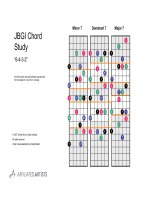02 2 stream annotated tủ tài liệu bách khoa
Bạn đang xem bản rút gọn của tài liệu. Xem và tải ngay bản đầy đủ của tài liệu tại đây (331.5 KB, 13 trang )
Online
Cryptography
Course
Dan
Boneh
Stream
ciphers
Pseudorandom
Generators
Dan
Boneh
Review
Cipher
over
(K,M,C):
a
pair
of
“efficient”
algs
(E,
D)
s.t.
∀
m∈M,
k∈K:
D(k,
E(k,
m)
)
=
m
Weak
ciphers:
subs.
cipher,
Vigener,
…
A
good
cipher:
OTP
M=C=K={0,1}n
E(k,
m)
=
k
⊕
m
,
D(k,
c)
=
k
⊕
c
Lemma:
OTP
has
perfect
secrecy
(i.e.
no
CT
only
aVacks)
Bad
news:
perfect-‐secrecy
⇒
key-‐len
≥
msg-‐len
Dan
Boneh
Stream
Ciphers:
making
OTP
pracYcal
idea:
replace
“random”
key
by
“pseudorandom”
key
Dan
Boneh
Stream
Ciphers:
making
OTP
pracYcal
Dan
Boneh
Can
a
stream
cipher
have
perfect
secrecy?
Yes,
if
the
PRG
is
really
“secure”
No,
there
are
no
ciphers
with
perfect
secrecy
Yes,
every
cipher
has
perfect
secrecy
No,
since
the
key
is
shorter
than
the
message
Stream
Ciphers:
making
OTP
pracYcal
Stream
ciphers
cannot
have
perfect
secrecy
!!
• Need
a
different
definiYon
of
security
• Security
will
depend
on
specific
PRG
Dan
Boneh
PRG
must
be
unpredictable
Dan
Boneh
PRG
must
be
unpredictable
We
say
that
G:
K
⟶
{0,1}n
is
predictable
if:
Def:
PRG
is
unpredictable
if
it
is
not
predictable
⇒
∀i:
no
“eff”
adv.
can
predict
bit
(i+1)
for
“non-‐neg”
ε
Dan
Boneh
Suppose
G:K
⟶
{0,1}n
is
such
that
for
all
k:
XOR(G(k))
=
1
Is
G
predictable
??
Yes,
given
the
first
bit
I
can
predict
the
second
No,
G
is
unpredictable
Yes,
given
the
first
(n-‐1)
bits
I
can
predict
the
n’th
bit
It
depends
Dan
Boneh
Weak
PRGs
(do
not
use
for
crypto)
glibc
random():
r[i]
←
(
r[i-‐3]
+
r[i-‐31]
)
%
232
output
r[i]
>>
1
Dan
Boneh
Negligible
and
non-‐negligible
• In
pracYce:
ε is
a
scalar
and
– ε non-‐neg:
ε
≥
1/230
(likely
to
happen
over
1GB
of
data)
– ε negligible:
ε
≤
1/280
(won’t
happen
over
life
of
key)
• In
theory:
ε
is
a
funcYon
ε: Z≥0 ⟶ R≥0 and
– ε non-‐neg:
∃d:
ε(λ)
≥
1/λd
inf.
oZen
(ε ≥
1/poly,
for
many
λ)
– ε negligible:
∀d,
λ≥λd:
ε(λ)
≤
1/λd
(ε ≤
1/poly,
for
large
λ)
Dan
Boneh
Few
Examples
ε(λ)
=
1/2λ
:
negligible
ε(λ)
=
1/λ1000
:
non-‐negligible
1/2λ
for
odd
λ
ε(λ)
=
1/λ1000
for
even
λ
Negligible
Non-‐negligible
Dan
Boneh
End
of
Segment
Dan
Boneh









